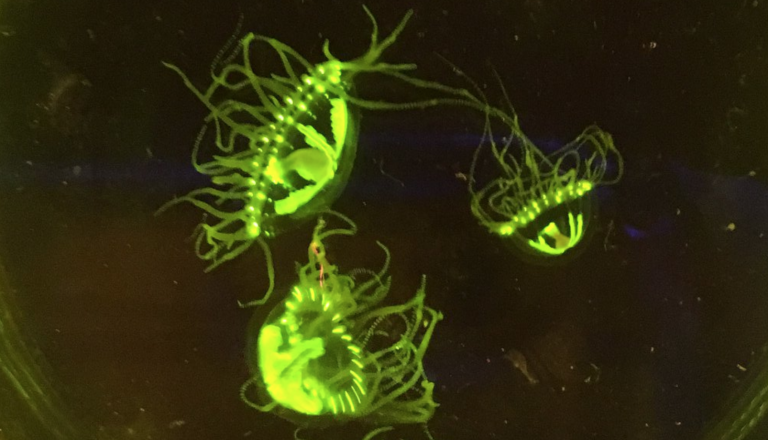Dangerous clinging jellyfish found in salt pond near South Jersey inlet
State environmental officials are warning the public about dangerous clinging jellyfish that were recently found for the first time in South Jersey.

Clinging jellyfish (Courtesy of Dr. Paul Bologna/Montclair State University)
State environmental officials are warning the public about dangerous clinging jellyfish that were recently found for the first time south of Ocean County, New Jersey.
The dime-sized jellyfish, native to the Pacific Ocean region, were found in a salt pond near a bathing area adjacent to East 1st Avenue and near the Hereford Inlet Lighthouse in Cape May County’s North Wildwood, according to the New Jersey Department of Environmental Protection.
Officials say it’s unclear how they clinging jellyfish entered the pond, which is fed by a stormwater pipe from roadways any may have connections with the Hereford Inlet.
The state is working with Montclair State University’s Dr. Paul Bologna to monitor the jellyfish in the pond and in other areas and has increased seasonal monitoring and investigation into the species.
Clinging jellyfish were first found in New Jersey in 2016 when a fisherman collected one near the Point Pleasant Canal in Ocean County. In recent years they have been found in parts of the northern and central Barnegat Bay in Ocean County along with the Metedeconk and Shrewsbury rivers in Monmouth County.
Along the Eastern seaboard, they were first found in coastal Massachusetts in the early 20th century. They are known to spread by ships.
Oceanus Magazine describes the species as resembling “a piece of art glass or a flash bling brooch you would never want to wear” with “hula-hoop skirts of 60 to 90 glass-like tentacles that uncoil sharp threads and emit painful neurotoxin.”
A state news release advises that clinging jellyfish are not known to inhabit ocean beaches or other sandy areas. Rather, they tend to attach themselves to “submerged aquatic vegetation and algae in back bays and estuaries — areas not heavily used for swimming,” according to the release.
Officials say anyone stung by the jellyfish — which can produce severe pain, muscle cramping, and other localized symptoms — should immediately treat the impacted area:
- Apply white vinegar to the affected area to immobilize any remaining stinging cells.
- Rinse the area with salt water and remove any remaining tentacle materials using gloves or a thick towel.
- A hot compress or cold pack can then be applied to alleviate pain.
- If symptoms persist or pain increases instead of subsiding, seek prompt medical attention.
If you see a clinging jellyfish, experts say to not attempt a capture. Instead, take a photograph, if possible, and send it to Dr. Paul Bologna (bolognap@mail.montclair.edu) or Joseph Bilinski (joseph.bilinski@dep.nj.gov) along with the location.
Anyone who spots these jellyfish or anything unusual can also post to the New Jersey Jellyspotters Facebook group. The New Jersey Department of Environmental Protection manages an interactive map of confirmed sightings.
WHYY is your source for fact-based, in-depth journalism and information. As a nonprofit organization, we rely on financial support from readers like you. Please give today.




